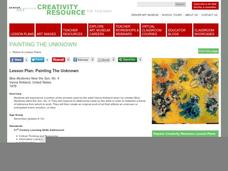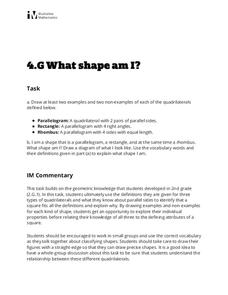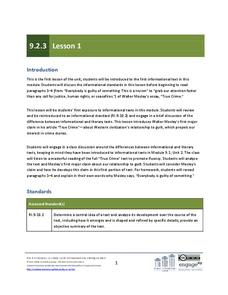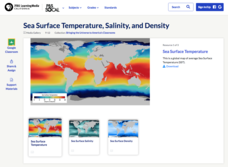Curated OER
Lesson: Painting The Unknown
Finally an art lesson that incorporates the act of creating art. After analyzing the abstract emotionally driven piece, Blue Mysteries Near the Sun, No. 4, learners discuss feelings related to an anticipated event or to the unknown. They...
Curated OER
Evaporation Inquiry
The evaporation of water and what happens to it as it travels through the water cycle are the focuses of this lesson. The evaporation of water seems like a "magical" process to people of all ages. This lesson takes away the mystery, and...
Curated OER
Human Body Riddle
The human body can be a mystery, or at least a riddle. Fifth graders pair up and use Photostory to create a riddle relating to a human body part and how it functions in the body system. They will compose a riddle, use a story board, take...
Curated OER
Leveled Vocabulary for And Then There Were None
Chaotic, perjury, tenacious, vague, predatory, idiosyncrasy. Using Marzano and Brown’s six steps of direct instruction for vocabulary (choose, restate, illustrate, use, discuss, play) readers of And Then There Were None engage in a...
Illustrative Mathematics
What Shape Am I?
Sharpen your pencil and grab a ruler, it's time to draw some quadrilaterals! Given the definition of a parallelogram, rectangle, and rhombus, learners draw examples and nonexamples of each figure. The three definitions are then used to...
Curated OER
Introduction to Ludwig van Beethoven
"Ode to la Tortilla" and "Ode to Joy"? Sure! Use Gary Soto's poem to introduce learners to the ode format. After examining the descriptive words Soto uses, class members study a poster of Ludwig van Beethoven, suggest words that describe...
Macmillan Education
The Tell-Tale Heart
Rather than who done it, the mystery literary detectives have to solve as they examine the evidence found in Edgar Allan Poe's famous "The Tell-Tale Heart" is why did he do it?
Southwestern Medical Center
Field Epidemiology: Investigation of an Unknown Disease
More than 90 percent of the people in a building have come down with an illness, and it is your job to investigate. Teachers give scientists the data needed to decide what is important and how they can solve the mystery. The exercise is...
American Chemical Society
Moving Molecules in a Solid
Who likes magic shows? In the fourth of five lessons, pupils view a scientific magic trick. The ball fits through the ring easily, but then moments later, it won't pass through anymore. What changed? Can we reverse the change? Scholars...
EngageNY
Grade 9 ELA Module 1, Unit 2, Lesson 7
Readers analyze David Mitchell's techniques for introducing and developing the mystery surrounding Madame Crommelynck in the "Solarium" chapter of his novel Black Swan Green.
EngageNY
Grade 9 ELA Module 3, Unit 1, Lesson 1
Clear up the misconceptions about autism and individuals on the autism spectrum with an inquiry-based instructional activity. As ninth graders read the first four pages of Temple Grandin's Animals in Translation: Using the Mysteries of...
Curated OER
Macromolecule Lab
During a macromolecule lab, young chemists perform multiple tests, including iodine starch tests, to determine if eight mystery foods contain lipids, sugars, or starches.
EngageNY
Grade 9 ELA Module 2, Unit 3, Lesson 1
"True-crime stories, murder mysteries, up-to-the-minute online news reports, and (as always) rumor and innuendo grab our attention faster than any call for justice, human rights, or ceasefires." Or so says Walter Mosley in his Newsweek...
ESL Kid Stuff
Halloween
Build vocabulary and get in the Halloween sprit with a collection of festive activities! Here, scholars take part in a holiday celebration, unearth the unknown in mystery feel-boxes, and create monster masks out of paper plates.
NOAA
Technology II
Ping, ping, ping. The last installment of a 23-part NOAA Enrichment in Marine sciences and Oceanography (NEMO) program explores technology use in marine studies, such as sonar. Activity involves simulating sonar techniques to identify a...
American Physiological Society
Did I Observe it or Infer it?
Take the mystery out of inquiry! When young scientists learn to use their keen powers of observation to make smart inferences about a situation, they are well on their way to understanding what the scientific method is all about. Using...
Towson University
Case of the Crown Jewels
Can your biology class crack the Case of the Crown Jewels? Junior forensics experts try their hands at DNA restriction analysis in an exciting lab activity. The lesson introduces the concept of restriction analysis, teaches pipetting and...
Science 4 Inquiry
Battle of the Waves
Which travels faster, light or sound? Scholars work in groups to simulate the ability for waves to travel through solids, liquids, gases, and through a vacuum. Then, they learn about the properties of a mystery wave and must determine...
Science 4 Inquiry
Body in Balance
The human body maintains homeostasis through the interconnection of multiple systems. Young scientists match these connections and discuss how they relate to each other. They apply their knowledge to solve the mystery of a treasure hunter.
Nuffield Foundation
Observing Water Moving Through Plants
We know plants assist in the water cycle, but how do plants get water from the ground into the air? Through a series of demonstrations or labs, scholars observe the movement of water through plants. They microscopically view the cells...
Curated OER
Merging New Technology with Old Stories
Is your city's history a mystery to your class? Ever wonder if your county contains a bounty of folklore? Young computer scientists incorporate technology with time-honored tales during a project with both individual and group...
PBS
Think Like a Historian: A Viewing Guide
Calling all junior detectives! Scholars use the tools of investigation to determine the causes and impacts of the American Civil War. Using viewing guides, videos, group research, and written resources, they discover what it takes to...
University of Pennsylvania
Using Comic Strips to Teach Multiple Perspectives
Scholars view comics from two different perspectives; one paints the Alfred Dreyfus as innocent, while the other portrays the exact opposite. They solve the mystery of what happened by analyzing the source, working in groups, and...
PBS
Sea Surface Temperature, Salinity, and Density
Earth's vast ocean is full of mysteries! Science scholars discover the big-picture properties that influence its characteristics at different latitudes using a lesson from PBS's Weather and Climate series. After completing a background...
Other popular searches
- Mystery Genre
- Elements of Mystery
- Mystery Book Reports
- Mystery Box
- Mystery Genre 5th Grade
- Mystery Lesson Plans
- Nate the Great Mystery
- Mystery Story
- Coloring a Mystery Picture
- Mystery Plays
- Mystery Novels
- Mystery Story Starters

























